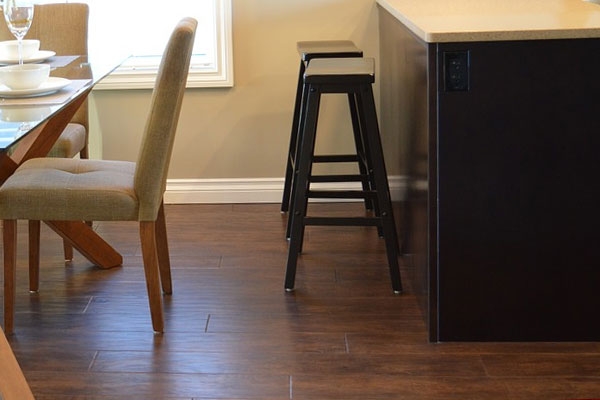Ceramic tile
Ceramic tile is a safe bet for nearly any style and budget. Options for color, size, shape and pattern are nearly limitless, so you can create the look that suits your tastes, whether you prefer country or contemporary.
Pros: Ceramic tile is an attractive, affordable, durable and easy-to-clean flooring choice.
Cons: It can be hard and unpleasant to stand on for long periods of time; cushioned mats can be used to offset that discomfort. Tile can crack as floors settle, and a glass dropped on it is almost sure to shatter. When wet, tile floors can be slippery. Also know that grout needs periodic sealing and special cleaning to keep stains at bay.
Porcelain tile
Porcelain tile is a subtype of ceramic tile and comes in countless shapes, colors and styles.
Pros: Porcelain tile is created with color all the way through the tile, so damage is less likely to show.
Cons: The tiles are even harder than ceramic, so standing on them for long periods of time can be uncomfortable. Grout requires periodic sealing and special cleaning to keep it looking fresh.
Hardwood
Wood flooring has made a major comeback in both new and remodeled homes. Wood’s popularity has always been strong — especially oak, maple, cherry and mahogany.
Pros: Wood floors are comfortable underfoot and have a warm appearance that seamlessly blends the kitchen with adjacent living spaces. They’re considered a good investment, often increasing the value of a home.
Cons: Wood floors are susceptible to water damage and scratches. Floors can be finished with oil and wax, but this finish is less resilient in a kitchen setting and requires regular waxing. Wood flooring that is factory-pretreated is often a more durable choice for a kitchen. Wood floors in kitchens typically need to be resealed every five or six years.
Laminate
Laminate flooring comes in a variety of styles imitating natural dark wood, light wood, bamboo or stone. Its affordability makes it attractive to many homeowners.
Pros: Laminate flooring can be installed directly over existing flooring, significantly reducing labor. The product is less expensive than hardwood or tile. Laminate flooring is less prone to scratches and marring than natural wood flooring.
Cons: Water exposure can cause laminate flooring to buckle or warp. Laminate cannot be refinished and has a significantly shorter lifespan than natural wood flooring or tile.
Vinyl
Vinyl flooring comes in either tiles or sheets. Available in a wide range of colors, designs and styles, vinyl is easy to cut. Vinyl sheets often require professional installation, but the tiles are a fairly easy do-it-yourself project.
Pros: Vinyl floors are durable, long-lasting and are often backed by warranties of 15 years or longer. Vinyl can be installed directly over the subfloor or over a previous vinyl or linoleum installation. These floors are easy to clean and offer the kind of cushioning desired by those who spend a lot of time standing.
Cons: Vinyl is manufactured using polyvinyl chloride (PVC), and this causes the flooring material to emit volatile organic compounds (VOC) into the air, especially when the flooring is new. Drop a knife on your vinyl floor? Slide a chair across it? Be careful: Vinyl can easily be scratched or gouged.
Concrete
Concrete can be a beautiful, low-maintenance and sustainable option for residential kitchens.
Pros: Concrete flooring is tough. While it’s possible to scratch or chip a concrete surface, you’d have to work pretty hard at it. A sealed and properly maintained concrete floor can last indefinitely. Concrete can be mixed and set to achieve an endless variety of color and textural effects.
Cons: Concrete floors are hard — if you drop a plate on one, it’s likely to break. They can also be uncomfortable to stand on for long periods of time. Concrete floors need to be sealed or waxed every three to nine months, depending upon the level of traffic.
See the original article at Zillow.

